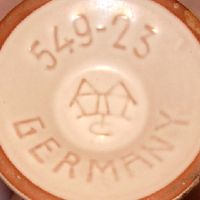
Image 010504-01-01
Impressed symbol of a farm house over "T" above "C", no windows, "Germany" only.
The famous Carstens family actually started off with a wholesale business for ceramic supplies which was founded 1878 in the town of Elmshorn (Sleswig-Holstein) and the 'Carstens Kommissionsgesellschaft' rose to become one of the leading distributors of ceramic supplies at the beginning of the 1930ies. By 1940, the company owned facilities in Rheinsberg, Wallhausen, Creußen, Hirschau, Gräfenroda, Georgenthal and the well known stoneware facility Uffrecht in Neuhaldensleben, which was followed by the Tönnishof facility. The name "Tönnieshof" is not the name of a town or city, it's the name of a former farm located in the small town of Moringen-Fredelsloh.
After World War II various former industries were relocated or reinstated to supply jobs for the surrounding areas. The Carstens company which had lost most of its facilities during the war was no exception and so the old farm named 'Tönnishof' became a new starting point for one of the former pre-war leaders in German ceramics industry.
To cope with the massive demand for kitchenware after the war, the Carstens family invested all of their knowledge and re-activated old pre-war contacts and business lines. The investment paid off and in 1950 the facility was back on fourth place of the list of ceramics manufacturers in Germany, even being able to open a subsidiary in the town of Freden.
This huge effort did not go unnoticed by other companies and in 1953, the Carstens family signed a contract with the Goldscheider company based in Vienna (Austria), in which Goldscheider allowed them to manufacture their figures under license. Licenses and business relationships with companies from Chile, Argentinia, Austria and Australia followed as the company expanded, resulting in a peak output of 10,000 units per day which were manufactured in an area with 15,000 m².
A few years and many bad decisions later the company was struggling with cheap imports and an ever changing market; losing one contract after another the factory ran into financial problems. At first it seemed that an attempt to save the company would work out and slowly the remaining workers started to hope that better times lay ahead.
Instead of learning from past errors, disputes and endless discussions between the members of the Carstens family tumbled the stricken facility back into oblivion. Not being able to cope with the situation anymore, many workers and designers finally left - resulting in a last frantic attempt not only to save the facility but also save the remains of the Carstens group.
But it was too late and the family disputes had finished a job that ignorance, bad decisions and market opposition had started. The Tönnishof facility, trigger of the initial disputes between the Carstens family members and ironically the last resort of the former Carstens empire finally had to file for bankruptcy on April 28th 1977. Soon afterwards, members of the Kiel family (all former workers of the facility) took over a part of the farm and today run a small pottery studio and a shop there.

Image 010504-01-01
Impressed symbol of a farm house over "T" above "C", no windows, "Germany" only.
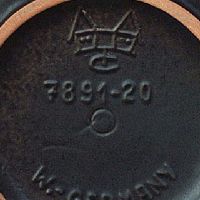
Image 010504-01-02
Embossed symbol of a farm house over "T" above "C", with windows, "W.-Germany".
(Picture by www.ginforsodditiques.com)
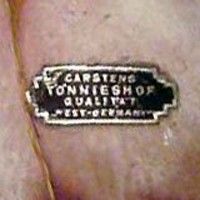
Image 010504-01-03
Stickers are hard to find, but here's an old one: "Carstens" above "Tönnieshof" above "Qualität" and "West Germany".
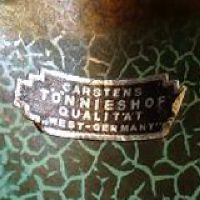
Image 010504-01-04
A better snap of the previous sticker.
(Picture by Monika Birkl)
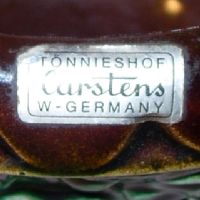
Image 010504-01-05
This is the newer sticker version in silver, simply "Tönnieshof" over "Carstens" and "W-Germany".
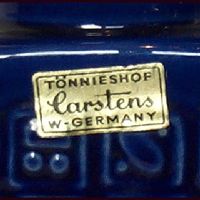
Image 010504-01-06
And this picture of course shows the golden version of the same sticker.
(Picture by www.ginforsodditiques.com)
© 2004-2026 C.S.Marshall, all rights reserved